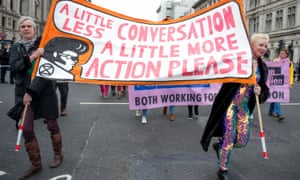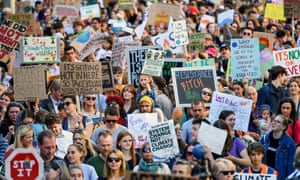When 110 people gathered at a hotel in Birmingham in January for the UK’s first citizens’ assembly on the climate crisis, the world was a very different place.
The assembly culminates this weekend after its final meeting in March was postponed and moved online due to the coronavirus outbreak, bringing a host of logistical challenges.
“We decided to split the same content over three weekends – I don’t know how you’re finding lockdown, but I’m certainly finding there’s a limit to how much time I want to spend on an online video call in one day,” said Sarah Allan, the head of engagement at Involve, the public participation charity that is running the assembly. “Also it’s hard for people, for example with young children, to be on a call all day rather than for shorter periods of time.”
Fundamentally, however, the format is the same, with assembly members hearing from expert speakers, asking questions and discussing issues in small groups, and using a secure online system to cast their votes. “In some ways, it’s surprising how little has changed,” added Allan. Those without internet access were able to join via their landline, with printed resources sent in the post.

But as with the many other aspects of life that have moved online in recent weeks, there have been hiccups. One participant, Ellie, a 21-year-old trainee teacher living in north London, moved back to rural Devon to be with family before the lockdown, and had some technical problems while joining the virtual meetings.
“That made discussion quite challenging,” she said. “And people have families coming in and out, and pets – sometimes it’s a little bit chaotic, but quite endearing and lovely to see where everyone is from.”
The assembly is made up of 110 people selected by computer to be representative of society from a pool of 1,500, who asked to be considered after invitations were sent out to 30,000 households chosen at random.
Over the past few weeks, experts have talked to them about a wide range of topics, including energy production, transport, agriculture and consumerism, with participants voting on a series of propositions related to each with a view to determining how the UK could best achieve net-zero carbon emissions by 2050.
On this final weekend the assembly will be discussing how the coronavirus pandemic affects the climate crisis, and members will be given an opportunity to raise any issues they do not feel have been addressed throughout – for instance, whether the UK deadline of 2050 for meeting net zero should be brought forward.
Ellie said she was aware of the urgency of the issue before joining the assembly, and her views have remained pretty consistent throughout the process. “My feelings as it’s coming to an end reflect how I felt when I initially found out I was going to be taking part,” she said. “I’m really thrilled that we got to make a contribution and I was able to be a part of it.”
But 52-year-old Adrian from Belfast, who works in the legal sector, said he had become much more aware of the effects of his individual actions. “I think having children makes you more aware of how you behave and the shadow that you cast across,” he said. “It’s the things that I can do, and the things I can change – in your routine, the way you live, how you travel – that’s the great takeaway for me.”

The assembly does not aim to provide a definitive consensus on issues, but to provide a snapshot of public opinion: if the participants are divided on an issue, the final report will reflect that. It is due to be published before the parliamentary summer recess starts in July, an exciting but also nerve-racking prospect for the participants.
“I think I’m cautious about the impact it will have politically,” said Ellie. “I definitely hope this will have a tangible impact and it will gain some kind of recognition. I’m sure it will gain some criticism as well.”
It is not yet known whether the report will be debated in parliament, although it will be used by the six select committees that commissioned it – and perhaps in other organisations as well. “I think it will be really interesting to see how it’s used by other people beyond parliament once it’s published,” said Allan.
Assembly members said they were aware the coronavirus pandemic had completely transformed society, and perhaps shifted public focus away from the climate crisis. But Covid-19 had also created a unique opportunity for a national and global reset.
“We would hope that [when] restarting the economy, some of the decisions made will be influenced by some of the suggestions we make here,” said Adrian, noting the rise in cycling and walking since the lockdown.
“Sometimes after these events [such as the coronavirus crisis] people have a greater community consciousness, and perhaps now is the time to use the recommendations to ignite that.”
The participants are hopeful that, now or in the future, their recommendations do help shape the country in a way that benefits the environment in the long term.
“I think the change will happen. It’s the speed at which it happens which is the key,” said Adrian. “But as I see those changes being made, I’ll be able to smile and look at them and say, ‘Well, I did that’.”